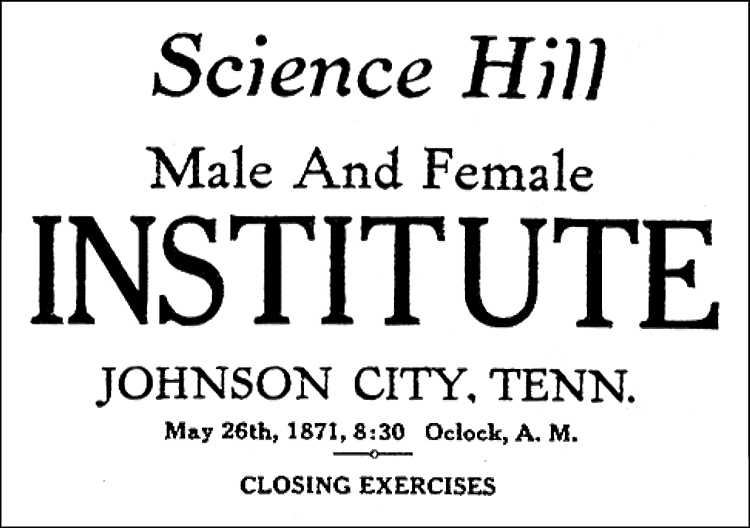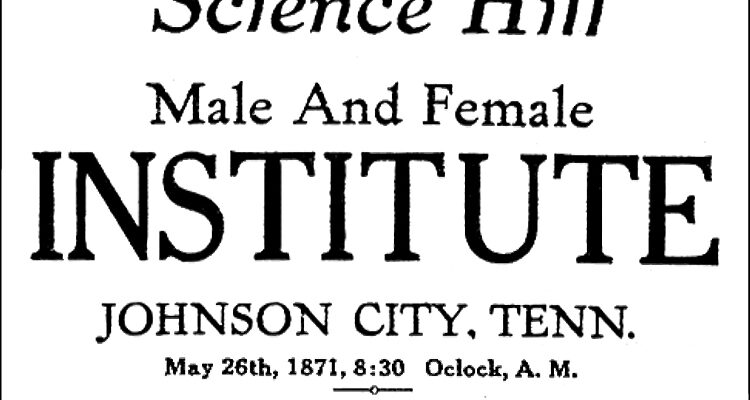The Sunday, July 3, 1921 Johnson City Chronicle identified a Samuel DeBusk as being the founder of Science Hill High School when it opened on Aug. 24, 1868. While I have heard of this person, I never associated him in the context of their being the founder of my high school.

The population of Johnson City in 1871 at the time of the first graduation was scarcely 400 inhabitants. Main Street was an open field playground and Roan Street was nowhere to be found. The surrounding landscape along Watauga and Unaka avenues as well as Southwest Addition were densely wooded areas without so much as a hint of a road.
The little village that would grow up to become the imposing city that we know today was centered on Market Street at the location of the railroad tracks on Fountain Square. It was at this same locale that city founder, Henry Johnson, built his first house, store and train depot.
According to the Chronicle, at that moment in history, Rev. Samuel W.J. DeBusk, a Methodist minister and graduate of Emory and Henry College, came here and with the help and support of Thomas A. Faw, Tipton Jobe and a few other leading citizens of the time reportedly founded Science Hill High School. The modest facility eventually became the mother of Johnson City’s educational institution.
Facts concerning the early clergyman come from Judge James W. Crumley who provided the Chronicle with the story and an 1871 graduating exercises program. I wrote a “Yesteryear” column detailing that document on 9-29-2008. The program makes no mention of Rev. DeBusk.
According to Crumley, the preacher, a quiet and unassuming lad with a great ambition for education, was the son of a poor family from southwest Virginia. His desire to enroll at Emory and Henry College was clouded by financial impossibility. However, through the guiding of his mother, he enrolled at the school. During his enrollment there, his mother was always in the shadows assisting her son by carrying food to him three times a week and giving him the few pennies that she had saved.
Upon completion of his college studies, DeBusk had achieved a superior scholastic record, but he lacked enough money to pay his diploma fee. He addressed the dilemma by entering an oratory contest and won top prize, which included the Robinson Prize metal. This allowed him to pay his debt with the school.
At E&H, it was customary for the victor to publicly hang the medal about the neck of his sweetheart. When DeBusk won, the crowd exploded with applause but became quiet when the prized medal was placed in his hand. Everyone wondered which fortunate lady would be chosen as the recipient. He walked down the platform to the rear of the room where he singled out a plain looking countrywoman with a checked sunbonnet tied to her arm. Taking the woman by the hand, he drew her to her feet, and proudly hung the gold emblem of distinction around her neck. His sweetheart fittingly was his hard-working mother.
Later, DeBusk brought his mother with him to Johnson City where she became a teacher in the lower grades of his school. He also brought his brother-in-law, Wylie W Smith, and brother, William, with him. They attended Science Hill and later graduated from Emory and Henry College. In time, DeBusk married a Smith lady from Southwest Virginia.
If anyone can provide additional information to authenticate or refute the Chronicle’s claim that Samuel DeBusk was the founder of SHHS, I would like to hear from you.

Comments are closed.